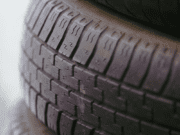Your mechanic says you need new tires.
Is he right, or just trying to make an extra buck?
Here’s what to look for to find out for yourself.
Check the Tread Depth
The tread on your tires is crucial for maintaining traction on the road, especially in wet conditions. Over time, the tread wears down, reducing your tires’ ability to grip the road and increasing the risk of hydroplaning.
A simple way to check your tire tread depth is by using the penny test.
Insert a penny into the tread with Lincoln’s head facing down. If you can see all of Lincoln’s head, your tread depth is less than 2/32 inch and it’s time to replace your tires.
Look for Tread Wear Indicator Bars
Modern tires come with built-in tread wear indicators.
These are small raised bars of rubber that become visible as your tire wears down. If these bars are flush with the tread, it’s a clear sign that you need new tires.
Inspect for Cracks and Bulges
Cracks, cuts, or bulges on the sidewall of your tires are a serious concern. These could indicate a leak or a weak spot that could lead to a blowout.
If you notice any of these signs, your mechanic is probably being honest in saying that it’s time for new tires.
Consider the Age of Your Tires
Even if your tires look in good shape, age can be a factor.
Most manufacturers recommend replacing your tires every six years, regardless of tread depth.
Check the sidewall of your tire for a four-digit code. The first two digits represent the week of manufacture and the last two digits represent the year. This will help you determine the age of your tires.
Feel for Vibration or Rough Rides
If your car vibrates excessively or the ride feels rougher than usual, it could be a sign of tire trouble.
While this could also indicate other issues like wheel alignment or suspension problems, it’s best to get your tires checked out as part of the diagnosis.
Monitor Tire Pressure
Regularly check your tire pressure.
If you find that a tire is consistently losing air, it could be due to a slow leak.
This is not only dangerous, but it also affects your fuel efficiency and tire lifespan. If a tire keeps losing pressure, it’s time to have it inspected and possibly replaced.
Checking your tires yourself can help you make an informed decision.




